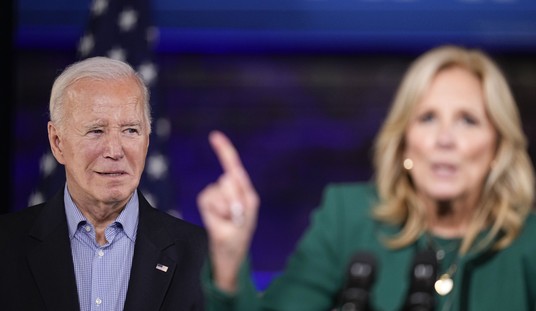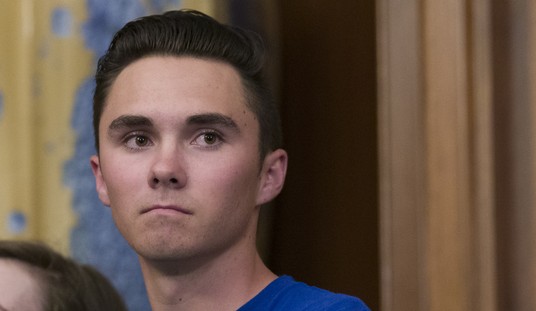Two people — identified only as “Senior Administration Official One” (SAO I) and “Senior Administration Official Two” (SAO II) — held a background briefing at the State Department on Friday to address Iran and Hezbollah’s worldwide terrorism. SAO I called Hezbollah a “criminal organization” that has “made an all-in commitment to defend and support the Assad regime,” “throwing whatever resources are required.” SAO II called Hezbollah a terrorist organization “morally bankrupt to its very core,” financed primarily by Iran, part of Iran’s strategy to commit “a significant amount of resources, both financial and otherwise, to the conflict within Syria.”
This produced a three-part question to the SAOs from Ilhan Tanir of BBC Turkish, worth reading in its entirety since it reflects what Tanir calls a “common theme now in the Middle East”:
First question is: Two days ago, State Department and the White House condemned in strongest terms Hezbollah duties in Syria and demand immediate withdrawal. Do you have any kind of news that they are heeding your demand?
Second question is: As far as we can see, they are still fighting fiercely. If they are not heeding your demands, what is your Plan B?
And the third: The common theme now in Middle East that Russia is taking care of its allies in Middle East, but U.S. is just basically talking the talk. But when it comes to supporting its allies and Syrian rebels, forces like Syrian rebels, it’s just giving advice and watching the situation unfolding. Syrian military — head of Syrian Military Council Salim Idris has been giving interviews for the last two days and basically begging for some help. There are 30 to 40,000 people, according to different estimates, that if the town Qusayr falls to regime, they might be in danger of imminent massacre. What are you doing besides giving condemnation and talk? (Emphasis added)
SAO I responded that (1) he would defer to others “on the broader Syria questions”; (2) the U.S. condemned the escalation in Syria by both sides; and (3) Hezbollah’s involvement has turned the conflict in “a new, more dangerous direction.”
He could have shortened his answer to Tanir’s three questions to: “no, none, and nothing.”
President Obama reportedly regrets having set a red line for Assad, now that Assad has crossed it. At his May 16 press conference, after it was clear the red line had been crossed, Obama was asked whether the U.S. would now take “more initiative” to effectuate his policy that “Assad must go.” Obama made it clear Assad need not worry about any U.S. action:
With respect to what I’ve said in the past around red lines — what I’ve said is that the use of chemical weapons are something that the civilized world has recognized should be out of bounds. And as we gather more evidence and work together, my intention is to make sure that we’re presenting everything that we know to the international community … for the international community to put all the pressure that they can on the Assad regime, and to work with the opposition to bring about that political transition. … But it’s not going to be something that the United States does by itself.
So the U.S. is basically a red line information-gathering service for the international community, hoping the international community will use the information to cause a political transition. The U.S. is not actually going to do anything on its own. Obama ended his answer by asserting he didn’t think anyone in the region “would think that U.S. unilateral actions in and of themselves would bring about a better outcome inside of Syria.”
In other words, asked to comment on his red line, Obama effectively provided a green light to those who might have been worried the U.S. might act. In the two weeks following the May 16 press conference, Iran and Hezbollah have dramatically escalated their involvement in Syria on behalf of Assad.
The Obama administration has responded with a background briefing.
Perhaps Obama now regrets not only having set a red line, but having adopted an “Assad must go” policy in the first place. The Wall Street Journal and Max Boot suggest he has decided an Assad victory is a safer choice than backing rebels who may be aligned with al-Qaeda. But the key to Obama’s foreign policy may be simpler than that: he favors whatever policy will require no action on his part.
It is not simply that he is risk-averse, or that his evaluation of the risks has changed. As Aaron David Miller noted on ABC’s This Week on Sunday, Obama is interested in transforming America, not the world; he views anything that diverts American attention from domestic matters as a threat to his agenda. Inaction abroad is a feature, not a bug. So his overriding goal is to stay out of foreign matters and let the “international community” take care of them.
In its April 25, 2012 letter to Sen. John McCain, the White House conceded Assad had likely used chemical weapons; the letter assured McCain that the administration is “pressing for a comprehensive United Nations investigation.” Likewise in Libya, Obama’s only response to the Benghazi terrorist attack in which an al-Qaeda affiliate participated has been an investigation.
Two weeks after the Benghazi attack, Obama told the UN it was an “attack on America,” but he quickly moved on to his real message:
But understand, the attacks of the last two weeks are not simply an assault on America. They are also an assault on the very ideals upon which the United Nations was founded — the notion that people can resolve their differences peacefully; that diplomacy can take the place of war; that in an interdependent world, all of us have a stake in working towards greater opportunity and security for our citizens.
If we are serious about upholding these ideals, it will not be enough to put more guards in front of an embassy, or to put out statements of regret and wait for the outrage to pass. If we are serious about these ideals, we must speak honestly about the deeper causes of the crisis — because we face a choice between the forces that would drive us apart and the hopes that we hold in common. Today, we must reaffirm that our future will be determined by people like Chris Stevens — and not by his killers. Today, we must declare that this violence and intolerance has no place among our United Nations.
…
We intervened in Libya alongside a broad coalition, and with the mandate of the United Nations Security Council, because we had the ability to stop the slaughter of innocents, and because we believed that the aspirations of the people were more powerful than a tyrant. And as we meet here, we again declare that the regime of Bashar al-Assad must come to an end so that the suffering of the Syrian people can stop and a new dawn can begin. (Emphasis added)
Like the Syrian red line investigation, the Libyan one is continuing — and now in its ninth month. Neither investigation will lead to any action by the U.S. under Obama.
Iran watches all this and undoubtedly draws its own conclusion: Obama sets rhetorical red lines, not real ones. Even if there is a new September 11 assault on America, and even if his WMD red line is crossed, he will do nothing but investigate. Even if Iran and Hezbollah move dramatically into Syria — after Obama has stated before the world that Assad’s regime must end — the response will be a State Department background briefing. The obvious conclusion is that when Iran later crosses its own red line (or rather, once an investigation proves beyond a reasonable doubt that the line was crossed), Obama will shift to containment.
Michael Ledeen writes that Syria is the Spanish Civil War all over again, a conflict with much larger consequences for a wider war, and Emanuele Ottolenghi agrees. History tells us all wars must end. But history also tells us that when a small one ends with a supposed superpower having stated a clear policy but not having much of a Plan A to back it up, and having no Plan B at all, and having earned a reputation for being all talk, the consequences of an even more important conflict will be larger, indeed.









Join the conversation as a VIP Member